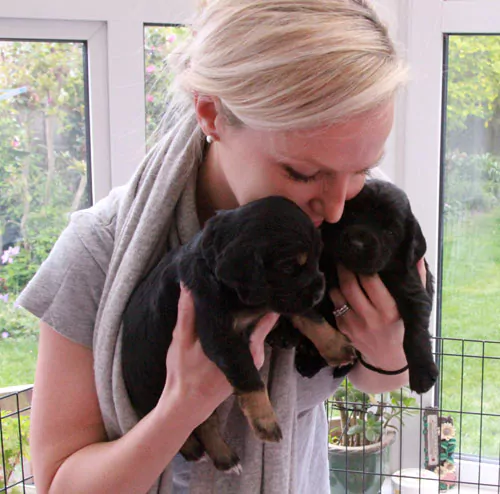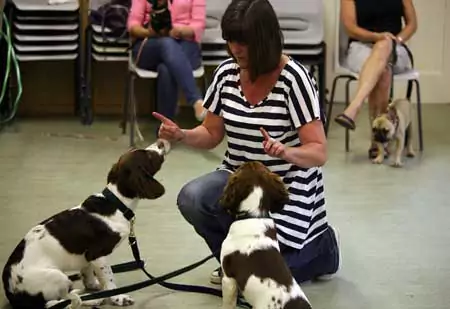Sibling Dogs: The Worst Of Both Worlds
Stan Rawlinson explains the pitfalls of buying siblings two pups from the same litter or rearing two young dogs together in the same home.
Buying Two Puppies

Rearing Siblings: On the surface, the idea of purchasing siblings appears to be highly commendable.
With the busy lifestyles, we now lead, it would seem feasible to take on two pups.
They could stimulate each other and keep themselves company, hopefully alleviating any separation anxiety.
They could also imitate the good characteristics of each other and will be able to do everything together.
Thereby benefiting from that closeness and companionship gleaning untold pleasure from each others company.
Sounds fantastic, unfortunately, the reality is far from this ideal, you really get the worst of both worlds in this scenario.
The incidence of owners purchasing “Siblings”, either same-sex or brother and sister from the same litter or two puppies from different litters and breeds but of similar ages is now more prevalent than at any other time in living memory.
The old professional dogmen and owners knew about the pitfalls and problems that this action would create.
Unfortunately, this knowledge now appears to have been lost on today’s dog owners
The puppies come to rely on each other and it weakens both of them, often to the extent that they become withdrawn from everything other than themselves.
I have called it “Littermate Syndrome”. Often one of the dogs will appear bold and the other timid. In reality, the bold one is actually somewhat withdrawn and timid when his littermate is not there to give support.
Unfortunately, it is normally a false boldness, in reality, he has been emboldened by the other sibling’s weakness. They often bark and yap at other dogs, and may either pretend to attack or actually attack to chase the other dogs away. This is normally fear-based. They become so engrossed with each other that all other dogs are seen as a threat to their mutual alliance.

They become super attuned to anything that may be invading their territory.
Often just soft sounds can trigger noise and warning barks.
Normally it is just one of the dogs that start this behaviour, then the other one joins in acting almost as a mimic.
This unfortunate pair may come to fear all other dogs and unknown people, plus any situation where they are separated from each other.
The stress this causes can often then spill over into aggression against each other culminating in fighting, in some cases causing serious injury or even death, known as “Sibling Rivalry”
Strangely enough, the worst fights are normally between bitches who can fight to the death.
Although nothing is set in stone, generally bringing together dogs with too many similar qualities, ie age, size, sex, temperament, and breed, may spark a conflict.
So many related characteristics make it difficult for them to decide who is the alpha or top dog; therefore fights occur because of the similarities.
Often, we can inadvertently cause the conflict; owners can disturb the hierarchical balance by rushing to protect the would-be subordinate from being “bullied” or “picked on”
The result of that is by granting him or her liberties, such as being petted first, which the other dog may consider his due can cause further stresses on the relationship. The lower dog may now feel emboldened enough to challenge the bolder dog. We need to understand that dogs have their own set of social rules, whereas we humans just want democracy.
What Happens in the Wild?: With wild canids, the young pup’s stay within their pack and play together constantly. That is true of Wolves, Wild dogs, Coyotes, Jackals, Dingoes and most other wild mammals.
Whilst these littermates are together they learn how to inhibit their bite, how to meet and greet each other and that all-important body language is learned from their siblings during this time. They mainly learn meeting and greeting techniques from their siblings, not the adult animals.
During this time, they also learn the rules regarding hierarchy, rank, and position and social interaction. That is why it is so vitally important that young pups go to puppy socialisation classes as young as possible.
In the wild, this play and interaction all happen between the time they are born and 16 weeks. Then like a light switch being turned off, they start to distance themselves from their siblings. Sleeping alone and showing aggression by threatening any sibling that approaches to within a two or three-foot radius often shunning extended contact with their brothers and sisters.
This is an inbuilt genetic device to make sure that they absorb into the pack rather than over-bond with their littermates, which would be to the detriment of the pack as a whole whilst hunting and working together.
Unfortunately, the domestic dog doesn’t have this switch, massive over-bonding can therefore occur. Their inter-relationship becomes so intense that it controls everything they do.
They suffer when separated, even for short periods of time. The relationship they have with their owners may also decline and they start to look inwards rather than outwards.

Siblings are also more difficult to train and in many cases will start fighting when they get to the onset of puberty.
They rarely reach full maturity as they tend to be mentally and sometimes physically stunted and inhibited by the closeness to each other.
I have seen German Shepherds and Utonagans bought as littermates where their ears have never become erect as with normal adults.
If it can have that type of physical effect just imagine what is occurring psychologically.
We see this with human twins. Schools now separate them into different classes so they can learn without the constant interaction with their twin.
Parents are advised from a young age to stimulate and play with twins separately, helping them to become more rounded adults rather than a symbiotic double act.
I have twin brothers and twin grandchildren, so I do have some experience of this phenomenon.. The picture above is of two of my granddaughters they are twins. holding sibling pups.
Fighting: In many cases where these sibling puppies have come to totally rely on each other, then frustrations can play a part in causing underlying animosity. This manifests itself in aggression as they approach both physical and social maturity.
Dogs see us as resources, we either become a resource controller or the dogs control the resources, once they control the resources you have trouble.
See (1) The Alpha Myth on my website. How siblings see the relationship between them and their owners as a resource and they will fight over the attention and resources you give them. It is always sparked by one dog seeing or believing the other dog is getting more resources. These dogs will rarely fight each other when no one is there.
Fortunately, I have a very high degree of success in sorting out inter-dog aggression especially with two dogs in the same household such as siblings or just two dogs that do not appear to get on anymore.

Castration: If you have to neuter and I certainly do not recommend it for many reasons covered here whatever you do you must not spay or castrate both dogs.
Read my article (2) The Dangers of Spaying and Castration, it is not as simple or clear-cut as people imagine.
In fact, it is very dangerous especially if done before maturity. It is called paediatric neutering
Never neuter both dogs especially if these dogs are male. If you are going to castrate, it must always be the less dominant of the pair that is done.
If you castrate both, you are taking away important actions and options for the future. If the fights are about dominance, position, and rank then neutering both leaves them at the very same level as they were before neutering. However, with professional advice, and if they are male dogs and the aggression is caused by hormones and in particular testosterone, then neutering the less dominant allows a distinct gap between the dogs level of position and rank in their hierarchy
With females, it is even more complex. Neutering can increase the level of aggression rather than diminish it. taking away vital calming hormones such as Oestrogen and Progesterone can fuel the level of aggression to the point that they could fight to the death.
If you need to break up a fight, squirt the dogs with water, throw a blanket over them or make a noise aversion therapy sound to break the circle of aggression by distracting them.
Never attempt to break up a dog fight by grabbing the dogs by their collar or getting in between them. Grabbing dogs whilst they are fighting can result in “redirected aggression,” where a dog bites you because he thinks you are part of the conflict. Sometimes the problem can be resolved if instead of protecting the underdog the owner supports the hierarchy ie the top dog.
Firstly determine who is the more dominant, reinforce that position by feeding, greeting, playing or letting the top dog out first. Usually, this will help, but not always. “The problem with that approach is that it’s often difficult to tell who should be the alpha dog, it is also difficult for owners to play favourites with their dogs.
Two Choices: To my mind, you have two choices with siblings from the same litter or two young pups from different breeds, Whilst I believe the first solution is the most practical, which is to re-home one of them, I am also aware it is the hardest and most difficult for the owners. If not they will always be damaged by their almost total reliance on each other.
If you decide to choose this alternative, you can home one of the dogs with another family member or a trusted friend. You will see dramatic improvements to the personalities of both pups. These changes occur almost immediately. Be aware that the longer you delay the harder it will be to part with one of your pups. It is a difficult and agonising decision for someone to make. However, in the long run, it is in yours and ultimately both your dog’s best interest.
Your second choice is to create two individual dogs, with two separate identities and personalities, without the total reliance on each other that normally happens in these situations. To do this you will need to work twice as hard because all the things you did together you will now need to do totally apart.
Things You Must Do: Everything must now be done independently to allow for the Siblings to have any chance of becoming separate entities instead of the reduced sum of the whole.
- Walk them separately
- Feed them separately
- Train them separately
- Crate them separately
- Play with them separately
Literally, everything you do should be separate. That includes Puppy and Training classes if possible, take them to a trainer that understands the inherent difficulties of raising two puppies together. Take them on separate nights if that is available, hopefully to the same trainer. They can play together but only at strict designated times and for a period of no more than 15 minutes each designated playtime.
This regime will not be for life, as the pups will after a period of about 12 to 14 months have formed their own personalities and temperaments; at this age, they will have become confident of their own individual abilities. Not as in most cases total inter-dependence on each other when they are raised, trained, and fed together.
Without the total reliance on their sibling for constant support, they will grow and blossom into much rounder and less aggressive and fearful individuals. I cannot stress how important it is to separate the siblings until they are older. It will produce two individuals rather than an impaired two parts of the whole.
It is worth stating that it is not only siblings that have these problems. If you raise two young pups from different litters or even breeds, you can have similar problems. I always recommend my clients to wait until their puppy is 14 months old before purchasing another puppy. This allows you to concentrate all your efforts on that individual, with a fair wind and good early socialisation, it will take on some of the good traits of the older more experienced dog.
I think what truly annoys me are the breeders that sell siblings knowing that it will cause behavioural problems. In some cases, they actually use emotional blackmail to push two pups on the unsuspecting buyer, For instance, “what a shame you can’t take two as I may have problems as he’s so small/white/little/runt etc and I’ll probably have to have him put down in the end”.
I have no respect for a breeder that uses these tactics or those sell littermates to one owner. If they are experienced and not a first-time breeder then they are well aware of the pitfalls of these actions, and that the dogs will suffer for the rest of their lives.
© Stan Rawlinson October 2002
Updated regularly last update 2020
(1) The Alpha Myth
(2) The Dangers of Spaying and Castration
You can use this article in either your own website or printed, but only with the following statement at the top of the piece with the link back to my site:
© Stan Rawlinson Dog Behaviourist and Expert Witness is the author of this article and 120 + others. www.doglistener.co.uk
Leave a Reply Cancel reply
You must be logged in to post a comment.







Comments (47)
2 puppies
Further to the excellent article on why not to have 2 siblings from the same litter, I wonder if I could have advice on our predicament. We have a 6 month old cockerpoo bitch who has been wonderful. We have just agreed to take on a second bitch pup, also from the same litter, who hasn’t settled in her new home because of 2 bigger dogs and a difficult family set-up. We can back out at this stage (we’re not due to take her for 3 weeks). Having read the article by Stan Rawlinson, it would seem that we’d be foolish to enter into this. But, as they are both going to be 7 months old when they get together, are the risks smaller? The second pup is smaller than our one. Neither have been spayed.
Many thanks
Two Puppies
Sorry I did not see this comment until today.
The simple answer is it will be slightly easier, however I believe you should not have another young dog when your existing pup is under 14 months. After 14 months you can get a another dog. If the dog you are getting is also over 14 months and the pup is seven months then that is OK as well.
Stan
Two year old Jack Russells
Hi. I wonder if you may be able to help. My partner and I have aquired two spayed female jack Russells die to their previous owner being unable to cope with them. One of the dogs is more dominant and the other more nervous.
It was not my choice to have littermates and we are having a few problems. They are very intolerant of my cats and other dogs, we seem unable to fully house train them despite constantly trying and they bark a lot. It’s not easy but they are generally happy, friendly and loving little girls that we have grown to love over the past few months.
Would any of your advice work for dogs this age? Happy to try anything although my parter won’t hear of rehousing one of them.
Thanks so much!
Siblings
Hi
The article above states that one more nervous than the other is almost always the case in rearing siblings or two pups from different litter of similar ages.
Try the Jingler and the OFF command it can make a massive difference to the behaviour of your dogs.. You will need two of each. Unfortunately in nearly every case i have dealt with the siblings have been intolerant to other dogs breaking up their bonded state. That is definitely one of the bigger of the many problems that can arise by taking on siblings.
House training can be done but you must use a crate especially at night and follow my articles on toilet training on the website.
Best of luck
Stan
2 female mutts from different litters
I did some research on raising my pups and being that your article seemed to be most helpful, i was wondering if you had any advice. My pups are 6 months apart in age. Bailey, the alpha, is 11 months old, is a basenji lab mix, has been spayed, and has also been through puppy as well as intermediate training before I adopted the second dog. Lucy, is 5 months old, is a blue lacy mix, and has not been spayed or been to training. She is signed up to start in 2 weeks with the same trainer I took Bailey too. A couple questions, should I get Lucy spayed even though Bailey is the alpha? Should I start feeding them separately or is it too late? (I have had Lucy for 3 months and have been feeding them together from the same bowl). They are crated separately and walked separately, and dont fight at all, yet at least. They play, and love each other but are also fine doing their own thing. I have noticed some anxiety and crying though when I take one with me and not the other. Any advice??? Thank you! -Jenny
Female mutts from different litters
With regard to neutering may I suggest you read my Dangers of Neutering Overview. Try and keep them separated quite a lot that means at night if possible until the youngest is 14 months of age that should help.
Advice on two pups
My sister and I purchased dogs from the same breeder, but different litters. They are only a week apart in age. We do not live in the same house, but plan to spend a lot of time together going forward. Whenever the pups are together they fight all the time. We just thought they would grow out of this. Our breeder told us it was normal puppy behaviour. After reading your article about raising two pups together I am really worried about the two dogs getting along when they are grown. They live in separate houses but probably see each other most days. Sometimes we spend the evening together, sometimes for a walk during the day. we go to puppy training school together. Should we not do this. Should these pups be kept completely apart? It is really important that our pups get on when they are older as we plan to holiday together etc. Etc. Help!
Advice on two pups in different households
I read you your concerns and think the separation you are doing is enough to stave of littermate syndrome. The pups are not together each minute of the day. Though i would certainly separate them at the classes as they may not get the most out of these classes> Having said that I think you will be fine. Sorry about the delay in answering
Advice on two pups
Me and my sister have the identical problem to the previous query. Am very interested how to help these two guys stop constantly fighting when together.
Advice with two pups
See above i think this covers your concerns The fighting with young siblings is normal. After all, that is what they do in the litter that should subside given enough time and patience.
Separating fighting siblings
My partner and I adopted two sibling puppies this year (male and female). They are now 6 months old. They fight regularly, particularly when my partner and I are around. They steal each others toys and bones, even when they have their own, they growl at each other for no apparent reason, the female is particularly aggressive. As they are now getting bigger we are becoming worried that their fighting could become dangerous. My partner and I are considering separating the two dogs, having one in each of our homes- which we travel between regularly (we also have people in each home who will be able to walk and play with them when we are absent). Will this have a positive effect at this stage in their development? If we do separate them, the ultimate goal would be to eventually all live in one home. If we keep them separate over the next year, allowing them to develop individually, will it be possible to reintroduce them later? Or will the issues return if they live together again? If we do separate them, can we bring them together occasionally, say for the day, or will this cause problems? I would really appreciate any advice you could provide. Thanks
hi, are your dogs fixed?
hi, are your dogs fixed?
Seperating Fighting Siblings
I would definitely separate them as soon as possible and allow them to grow up not relying on each other. They should be OK to bring back together on a fairly regular basis and can live together after 14 months.
sibling puppies
Sadly we wished we had known about the pitfalls of having sibling puppies. We got two adorable puppies a week ago and it’s already clear that this was a huge mistake – they fight continually. They are now in separate crates at night, and are hoping the breeder will take one back. It’s a heartbreaking decision – but clearly the right one.
Siblings
I read this and my heart sank. I bought two female Shiba Inu puppies. They’re half sisters. I thought I was buying them from a reputable kennel. They were 14 weeks old. When they arrived I had never seen such traumatized puppies in all my life. It must’ve been a puppy mill they came from. One of the girls has warmed up to me but the other is so skittish, she jumps at the slightest movement. She is slowly warming up to me but is still very scared of me. If she escapes out of the yard it’s a nightmare to get her back. For example she got out yesterday and wouldn’t come back inside the gate. I left it open and she eventually came to the door at 04:30 this morning, hungry and cold.
The last few days the two of them have started fighting and its viscous. It started over food now it’s progressed. I have a neutered male and they were playing with him this afternoon when they suddenly turned on each other. I had to jump in and separate them. It happened 4 times after that. I gave a time out by putting one in the bathroom for 10 minutes. I am so frustrated yet I love them. I know they’ve had a rough start in life. I want to help them. I see progress but now this is a new aspect in their lives. When Tima won’t come home I wish I’d never taken them on but I was so happy when she came to the door at 4:30am. What do I do though going forward? I really want to help them. It’s been 3 months. Kayla is very friendly with me and Tima is still afraid of me but slowly making progress. Will they get beyond this period? Any help would be appreciated
Mike
Fighting sisters and we’ve got a baby on the way
Hi,
I already tried to post this once, so if it double posts, forgive me–I’m a bit of an emotional pregnant lady.
We adopted two Indian street dog puppies–female siblings–from a shelter when they were about 2 mo old. They are now 9 mo. They both hit puberty at about 6 mo. The last couple of weeks tensions have been growing and they just had their first big fight. (drew a little blood.) I was totally at a loss until reading this article, as they are generally happy, affectionate, and obedient with my husband and I, each other, and dogs that they know. (4-5 street dogs who live on our road.) BUT they are very very territorial and anxious with strangers or unknown dogs, growling, barking, or sometimes even chasing people who come on our road. One of them in particular shows a clear preference for playing with her sister while her sister plays with the other dogs, if that makes sense.
To help them develop socially and decrease the anxiety and fights, is it worth it to try favoring the bossier dog? Especially if the bossier dog is also the more socially anxious one? If that doesn’t work, is 9 mo. too old for separate feeding/walking/training to do any good?
We’ve got a baby on the way, and I really don’t want the stress of tense dogs and a toddler in my future.
Thanks so much for the article, and any other info you’re able to give.
Answer to Fighting sisters and we’ve got a baby on the way
This is a difficult one to suggest remedial actions the fact you are pregnant can cause issues as your dogs know you’re pregnant. The change in hormones is easily perceptible to dogs as the change come out through your skin and breath>
Socialisation problems are in some cases related to them being antisocial and territorial. That problem arises from lack of socialisation during the first 16 weeks of their life. Read. https://www.doglistener.co.uk/puppies/socialisation.shtml It may not be too late to try and socialise them with people or other dogs but it going to be very difficult as you have two of them.
I would also read Dogs Fighting In the Home Which is an article I wrote a few years ago which is also first on Google.
2 brothers fighting
Hello just wanting some advice please i have 2 staffordshire bull terriers they are 8 now had them since 9weeks old both male and from the same litter. They have a love hate relationship and since we have moved house in october they have been very unsettled and had a few fights. We have tried classes and trainners coming to the house but noone seems to understand them as they are fine and happy when they come. We now have a little boy and so i want to address the problem after reading your article i now know we shouldnt of got 2 together but will seperating them now as a last resort cause more harm than good as they fret without each other im not sure what to do for the best ?
2 Brothers Fighting
My article on Dogs Fighting in the Home is first on Google it is curable but not many behaviourists know how to facilitate this. I have treated over 300 cases of interdog fighting in the home nearly all were successful. Unfortunately, i have now retired and I would live to recommend someone who could do what I can do however that is not the case.
Sibling help
I have two siblings, male&female, who were feral living in the woods when I got them at 3 mos old, one week apart.
We did intensive separate training with them from the beginning, socialization, etc and they are sooo much better but had a setback.
Positives: They are wonderful together at home with me, with my friends and happy laying at my feet in a coffee shop. They are cuddly, playful and funny. Adorable. If they play fight too rough, they stop and kiss each other. Have never actually had a real fight or hurt each other.
They have bonded with me and listen to me pretty well except below. They aren’t great out in the world when other dogs come up.
My girl is a bit bitchy/reactive when dogs come up to her and the boy wants to protect. We broke them of this with a trainer and dog day care last year and they had a setback when we stayed with friends whose dogs barked at them constantly.
They have never bitten but it’s still stressful to walk them.
Also just moved back to No. Virginia and they want to chase every squirrel and duck along the waterfront path in Old Town Alexandria. 42 and 49 pounds-so can’t function like this, and walking them separately for the rest of their lives doesn’t work. We tried gentle leaders after harnesses and my girl is getting hurt.
We can’t go to dog parks or daycare but they need they exercise and socialization. And, I am stressed walking them with all the random off-leash dogs we encounter all over OT.
Last priority is more kid training.
They are better apart than together right now in the above situations.
We have been together two years, and I really don’t want to break them up if re-training them is possible.
Need someone to help us reset and move forward again asap. Do you have any counterparts in the DC Area USA?
I have the next 3-4 weeks with some extra time to focus on this. Ideally, I would like to find a trainer to take
my girl and focus on her for a couple of weeks while I focus on the boy-I feel like we need to break their cycle
with some separation. And then train me on her and both together. Because they did well before and were making dog friends, I think with consistency, they can get back on track.
What do you think? Is this salvagable or was it inevitable and they need separate owners? Again, home life is good. It’s interacting with the world that is an issue. She is tougher because she knows he will join. He is in protection mode when she’s around.
If I should separate them, will need to do it before more time passes. Thank you for all the info on your site. I wish you were here!
Sibling help
Unfortunately, i really do not have any contacts in the USA so I couldn’t really recommend anyone that would have the knowledge to work with these two. It can be salvageable. For a period of time, you should work them separately. I would suggest you buy my jingler and DVD as it will certainly help with the lead work conder the leads as well as they are manufactured with the jingler in mind.
You certainly can improve these dog behaviour up to a degree. If you can find someone that understands why this is happening then that would b a good start. Most believe it is just related to hormones and dominance, That could not be further from the truth. I wish you the very best for these dogs.
How to go ahead with adopted pups
I have just adopted 2 pups of a litter. Both are females and from the streets. They went from the streets to a foster and back to living on the streets, and I don’t want to release one of them back to the streets as its dangerous, and I don’t have any other alternative. They are about 3 months old and are currently eating and sleeping together. Can I separate them and raise them well in the same household? How much together time can they get? I got 3 of their male siblings adopted into separate homes with great difficulty (took me 3 months of relentless posting and follow up on social media), and female dogs don’t get adopted soon. I’ll try putting up one for adoption but not too hopeful there. Is it too late to separate them? Should I do it slowly or quickly?
Adopted Pups Reply
Lots of questions here the simple answer is in the article it explains what you should do if you keep them. With regards to trying to rehome on then if you could, that will be fine the dogs will initially be fretful and miss their siblings but this should be overcome within about three weeks.
Pups
Hiya i am wondering if i could have so w advice . I have 1 male neutred jack/chihuahua 3 years old ai always have 1 female jack/chih 2 she recently had a little of 4 jack/chih we gave the two female to family and ended up keeping the two boys they are 15 weeks old now . Does this article aply to them also if i have another two dogs ? Is there anything I should look out for ? They play fight alot but mostly with mum one is more vocal than the other .
Pups
This article definitely applies to them. I had a litter of puppies 14 months ago working cocker spaniels see below.I would have loved to keep two as all my spaniels are working gundogs. Fortunately, I was aware of the very real dangers and just kept just 1 called Gunner. If you can I would rehome one.
Rescue pups
Ok, I’ve been reading all of the comments and learning a lot. I live in a developing country and have ended up with 2 unrelated young dogs with very different eating backgrounds. No. 1 pup, Mellow, was born in my house when the security guard’s dog chose it as a place to hang out. 4 pups, rehomed 3 and the security guard was supposed to take Mellow. So for a few months she lived with me but I assumed that he would take her. But she wasn’t happy about his attempts to take her by force and sticks. And everyone else threw stones at her because this is the local way of treating dogs. Eventually it became clear that I gained a pup. Through this, she was regularly fed by me and basically lived in a pack during the day and nights in my house. I moved and took her with me and lived alone with me for a while until I spotted n excruciatingly skinny pup at the side of a desrted road, took him home where he stayed in my bathroom for several weeks just eating and sleeping. He was terrified of me all this time but alert. At some point he suddenly decided to rejoin the world and camped out under my bed but still not interacting with either of us. Then he started joining us on the bed at night but still no interaction. Then mellow started licking him and encouraging him to play and before I knew it, he was able to be patted and came on walks etc. I estimate he is about 6 months old now and mellow approaching a year. They are really good friends and don’t fight at all. My problem is his eating. He is so nervous to eat around her and although I give them food in separate locations, or tried one inside, one out, me with him, he doesn’t concentrate on himself and is always more worried about what she’s doing. She was speyed a couple of months ago and he hasn’t yet grown enough. She is definitely alpha but not aggressive to him at all. How do I get him to eat? He’s so much healthier but still skinny. They are much the same height but he is really not looking as filled out as he should. I appreciate I should not have gotten 2 pups but equally they are really good with each other and each brings out the others character. She is an energetic clown, he is sweet and kind. Suggestions?
Rescue Pups
The main problem here is lack of socialisation and of course the neutering though I understand why you thought it necessary. Read my article on neutering. Get them into routines separate them on a regular basis and feed them twice a day in different locations. He has definitely bonded with the other dog however, you must be wary he does not over-bond as that causes untold problems.
Sibling dogs, separate families
Me and my sister both purchased sibling puppies, they live separately full time. However we regularly have family gatherings at our own houses and our parent mutual house and would always take both dogs, both being well trained, good with children and never showing any form of aggression to other dogs they were fine. Since turning around 18months they slowly started to have snaps at each other, we often found over toys, which we then removed when they was together. It now seems to be much worse and can lead to full blown fights over no trigger we can visually see? Is there any recommendations you can think of to rectifying this? Many thanks
Sibling Dogs Separate Families
Hi Stacy. This article really does not cover the problems you are experiencing as these dogs have been brought up in separate households, therefore, littermate syndrome does not apply. However, I have written an article called Dogs Fighting in the Home and this does cover the problems you are having and though you cannot see the trigger I can. It is all about resources and the biggest resource of all is the owners if these siblings see the other getting the attention they believe they deserve they can get concerned about losing that vital resource. Therefore it is fear rather than dominance based. The article will explain the problem in full. BTW it is also first on google if you type in Dogs Fighting in the Home so someone must be reading it.
2 fighting brothers
Hello, I’m hoping you can offer some help.
My sister and I purchased a French bulldog puppy each, both males. We’ve had them from 8 weeks old and they’ve always gotten on. Both have lovely temperaments, great with our nephews and children no problems at all. We’ve always gone on holidays together and we’re often both at my parents house at the same time with both our dogs. However, they have both just turned 2, and the last couple of months when they’ve been together they have been fine for an hour or so then out of the blue start to fight. First after a short while they got it out of their system and were fine together but as the fights became more frequent then they wouldn’t settle afterwards resulting in us both going back to our separate houses. We are at a point now where both scared to bring them back together in case they fight but it’s having a massive impact on our family socialising.
Neither of us want to part with our dogs, so what can we do?
Any help would be much appreciated.
2 Brothers Fighting
Hi, Stella, I think it was your sister that wrote the request above your and i have answered that in full. I hope it helps.
Kind regards
Stan
Seoperating Sisters
Hello, I wish my parents had read this artical. They bought two border terrier sisters in August, all was well until my sister’s French bulldog came to stay with them for a week.
Ever since the the sisters have had some vicious fights. They are now treated separately in every way, as per your artical. It is not easy for my parents and they are seriously investigating rehoming one of the pups.
I wanted to know if we took one in, would their behaviour change to toward each other and my sister’s Frenchie over time? My parents are at our house ever day but the pups would not have to be together, but all of us do spend Christmas and some holidays together.
I would like your thoughts before I offer to take one in.
Thanks in advance.
Separating Sisters
This is a difficult one as the fighting is all about the owner as a resource so in fact, they fight for the owner’s attention. Therefore if they have already started fighting separating them and then bringing them back together occasionally will probably end up in aggression again only that aggression could be enhanced by the separation.
3 dogs
We recently adopted a 5 year old miniature poodle. On the same day we also got a 8 week old cockapoo to keep her company from same family but not related.
The day we took them home the 5 year old gave birth to 1 puppy so now we have 3 dogs.
The 5 year old won’t have anything to do with cockapoo since having her pup but not a major issue.
2 pups are now 7 and 9 months and have started fighting daily. Any advice on how stop this behaviour? They never used to fight.
3 Dogs
This may be of help. https://www.doglistener.co.uk/Dog-aggression-Interdog-rivalry-in-home.shtml
Indian Rescued Brothers Fighting
Thank you so much for your work. I hope you read this message since I was confused about littermate syndrome. We live in India and rescued 2 male pups aged around 2-3 months (we rescued one 1 month before the other, whom we rescued because his leg was broken). We had 4 grown dogs in the house already, with whom the 1st pup (more adventurous and brave) got along much better. The 2nd is friendly too, but is often left out/prefers to be with humans. So they are pretty independent of each other and have different hobbies. They “play fought” a lot for a few months, before the 1st pup started asserting his dominance by attacking the 2nd if he ate food in front of him. We fed them separately and this solved the problem most of the time. Sometimes he still attacked him, though (at this point, the 1st was bigger in size). The 2nd one developed an OBSESSION with food and getting snacks 24/7 and grew quite fat. We identified the 1st as the alpha but the problem is that they are around 10 months old now and the 2nd has grown quite heavy and strong (due to constant eating) and since 3 days, the 2nd has been attacking the 1st almost with a vengeance. He has been trying to throttle him without any obvious triggers (food, attention, toys) – that too only late night and early morning, never during the afternoon. Please suggest what to do, he is otherwise the sweetest dog and we do not want to re-home him. Can’t identify who the alpha is now at this stage and whether castration should be the way to go. Have kept them in separate rooms for now.
Indian Rescued Brothers
My apologies I missed this question. One of the best ways with dog is who pees over the other. Dominance does not mean aggression and a dominant dog can very relaxed and good with all other dogs. Where the problems lies is often in the owners interference in the arrangements and hierarchical structure. It may be best to neuter the least aggressive and the one that pees first and the other mark over it.
Best of luck
Just so it’s not an echo chamber, I have siblings who are fine
I have two pitbull/dalmatian mix breeds. They were abandoned and I took them in when they were about 2 months old. I heard the term “littermate syndrome” and at first I followed the advice, separate walks, separate playtime, etc. but after awhile stopped doing it because it didn’t seem to do anything and seemed a little ridiculous actually.
They grew up fine, are very well behaved among all kinds of people and other dogs. They fight with each other occasionally, but I let them work it out themselves and they never hurt each other.
They are about a year and a half old.
My theory is that most “littermate syndrome” issues is really just people not providing enough care and attention to their dogs. When a dog is by itself, there isn’t much it can do, besides chew up a shoe or something. But when there are siblings that are abused, they take it out on each other. Then it’s easy to blame “littermate syndrome” then own up to the true cause of the issue, the owner’s behavior towards them.
Pitbull.dalmation mixed breed
If you read the article I do not say that all the dogs that are brought together have problems some don’t but the reality is that MOST of these young pups reared together will have significant behavioural problems. Just because it worked for you does not mean it will always work.
Sibling 15 month old dachshunds
Hi Stan,
I’ve read a lot of articles on sibling rivalry after our two mini dachshund (intact male siblings) started fighting. Your article mirrors our exact scenario at home. I’m considering re-homing one of the boys but I need to know I’ve tried all avenues before this as it was my ignorance that caused this outcome.
The boys are 15 months old, it was difficult to see which male was the more dominant one until the dapple started bullying his chocolate brother. It’s like the article says, it’s more of a false bravado, he struts and acts like the dominant one but there are a lot of underlying issues. The dapple has more obvious social issues and the chocolate seems to have now picked up on these and mimics his brother. They will bark, chase and now nip at other dogs, but the most worrying behavior is the direction their relationship is going. The dapple fires up easily, his heckles go up if he’s not comfortable and he will take it out on the chocolate. I’ve seen tension after letting one dog outside alone, tension after meals, after being scared by a car, while trying to move one of them…. the list goes on. We’ve just learnt to recognise the warning signs and distract them. I feel it’s becoming quite detrimental to their quality of life especially for the chocolate.
Their personalities are very different, the chocolate is very affectionate with us especially with our 1 year old daughter but is reserved when he thinks he needs to be with the dapple. The dapple is less interested in us, he’s driven by chasing and chewing toys. I often see him circling and directing his brother when he tries to be independent. When they were younger the chocolate would try to socialise with other dogs and the dapple would get in his face almost saying ‘stop that!!’
They have separate crates and we did start walking them separately on occasions after doing some research. They are inseparable and suffer from separation anxiety (with each other and me).
They are very good together until they’re not…
Their recall is great at home, not great outside and they have learnt basic commands – sit and wait. So they aren’t totally distracted by each other.
They are both food driven and enjoy their raw diets but don’t get as much exercise as they should / Mainly due to being a new Mum and my husband works away. We’re expecting another child in April so are trying our hardest to work on the situation. Should we be working on strengthening their independence from each other? should we neuter the less dominant? Should we do the hardest thing and re-home one? Any advice would be hugely appreciated!
Sibling 15 month old dachshunds
At 15 months strengthening their independence will not work. You really have two choices find a behaviourist that understands what this is all about. Unfortunately, I retired 4 years ago and have dealt with numerous cases successfully but I am a bit of a one-off. I learned from experience, not a book. I would love to recommend a behaviourist but most are totally useless and they believe that by ignoring the bad behaviour it will go away. Try telling that to most of today’s children who know they rights but rarely respect ours.
To castrate or not? 2 pups from same litter (female & male)
Hi!
Thank you for this article.
I was hoping to find some advice on to castrate or not. They are a husky/ labrador retreiver mix. My female is the rut of the litter.
Both dogs grew up with other dogs different age, size and breeds for about 6 months while living with my grandparents. I then took both into my new apartment at 6, almost 7 months old. I feed them separately. They get plenty of outside time to socialize with other dogs, almost everyday. My female is sweet, distracted and can be fiesty. and my male is smart, silly but responsive. With other dogs my female is much more interactive. My boy is interactive but when bigger dogs come to play, he kind of whimpers until he can get away.
Now, I’ve been having such a hard finding good information on castration for our situation. My girl just got into heat at 8 months old. Me and my boyfriend prioritize our dogs so we always have our eyes glued on the both of them to avoid unwanted pregnancy. My boy was persisting for the first week but wasnt aggressive. It was at the 2nd week when he became overly persistant and excited and aggressive. None the less he responds to our command when we throw a towel in a hitting motion in between them. I would like to know what the best option is for them. Is it ok to keep them unfixed or would it be beneficial to have one of them fixed? Thank you sm!
Second dog
Hi
Please could I ask some advice about getting a second dog? We have a 5 year old male neutered Labrador. He is well trained and has a lovely nature. We have a busy household with 4 children (over 9 years old), and cats. We want to get a Springer Spaniel puppy from a local litter – we know both parents. However I am concerned about whether to get a male or female, and whether this will upset the existing dog particularly if the younger dog becomes more dominant?
Thanks
Hi Sarah I
believe in having more than one dog in a household as it gives the older dogs a new lease of life and keeps them fit and healthy as your dog is neutered it may be better to consider a female and that may alleviate any dominance issues. Read this article it will really help you prepare for the new puppy. https://www.doglistener.co.uk/introducing-newdog-into-dog-household . There is an old saying about Labradors and Spaniels. Labs are born half trained Spaniels die half trained.
Best of luck with the new edition
Littermate syndrome is just another silly label that people throw about. If you have the time and are prepared to put in the work/effort its not an issue. The truth is some people just shouldn’t have dogs.
Unfortunately, I think you may be one of them. The reason littermate syndrome was initially used is that it was a well documented and researched fact that allowing littermates to two puppies from different litters to be raised together caused numerous problems both behavioural and medical. Save us from amateurs that think they know something about rearing dogs.
Hi,
At the end of last year, we got 3 female puppies from the the same litter, staying in the same household (which already had 2 male dogs) with the view of two being taken to when the owners move out this year/next year! The puppies are now 9months old and over the past month or so one of the puppies have started becoming aggressive towards the other dogs in the house – especially over toys and space. She has become less aggressive towards food. We have had no issues or concerns with aggression towards people. I have recently taken my dog (the one becoming aggressive) out of the home. Was this the right thing to do? My dog appeared to be more relaxed and even with cats in the new home, we have not seen any signs of aggression.